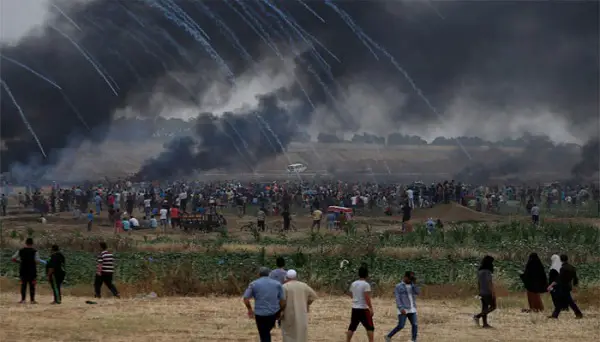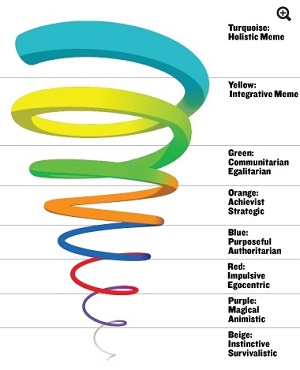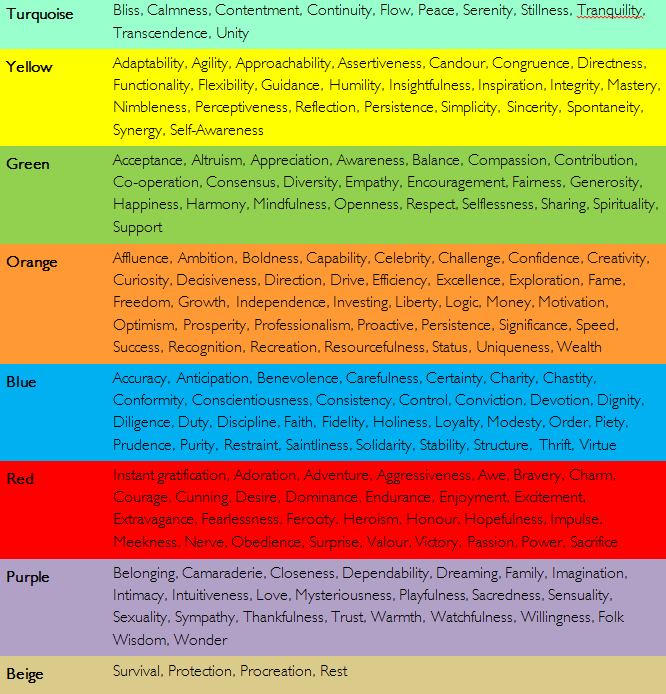|
TRANSLATE THIS ARTICLE
Integral World: Exploring Theories of Everything
An independent forum for a critical discussion of the integral philosophy of Ken Wilber
 Neri Bar-On is a professional electronics engineer with degrees from Tel Aviv University in economics and philosophy. He lives in Tel Aviv. Neri Bar-On is a professional electronics engineer with degrees from Tel Aviv University in economics and philosophy. He lives in Tel Aviv. Facebook Group (May 19, 2018) with permission of the author.  Overcoming Intractable Elements in the Israeli-Palestinian Conflict through Spiral DynamicsNeri Bar-On
The Israeli and Palestinians systems are not peers; their power structures and the world views that sustain the structures are very different.
The Israeli-Palestinian conflict seems to become more intractable by the day: if anything, in recent years both sides are marked by increasing radicalization. Yet the advent of Trump and his pattern of impatiently shattering paradigms could propel the stagnant Israeli-Palestinian process out of its paralysis. It is an opportunity to introduce the principles of spiral dynamics to the Israeli and Palestinian leadership, with the goal of forging a new, sustainable system based on both sides making a sober assessment of their real greater good, and collaboration. The Spiral Dynamic approach proved helpful before, in causing collaboration between two seemingly irreconcilable groups in South Africa. The case of Israel and the Palestinians is different but also involves aggrieved people with radically different narratives who are locked in vicious circles of retaliation. Points of originThe strife between Israelis and Palestinians is fanned by their own internal struggles. To oversimplify for the sake of brevity: Their internal battles both involve issues of identity, but they are driven by different conflicts within the sets of values of each society. The Israeli and Palestinians systems are not peers in the sense of being directly comparable; their power structures and the world views that sustain the structures are very different. On the Palestinian side for instance, there is no consensus on the merits of a peace agreement with Israel: the Oslo agreement had been signed with Fatah, which is Hamas' bitter rival in Palestinian politics. Hamas would take the opposing position to Fatah, to provide an alternative: in its case, a more radical one. Israel also has pro and con camps regarding a peace agreement with the Palestinians, but they are contained within the political system. Among the Palestinian communities, tribal values supersede, leading to factionalism and sects within the factions; that in turn impels the form of rule towards monarchism, as is evident in other Arab societies around the Middle East. While the Israeli internal conflict is contained, the conflict between Fatah and Hamas causes deaths; people get thrown off roofs for belonging to the other tribe. The Palestinian game is zero-sum; the Israeli game is more complicated. It is true that an Israeli prime minister was murdered over the Oslo agreements. But that was an aberration, and the opponents to the agreement became politically organized and built influence within the democratic political system, even becoming a mainstream political movement in recent years. Israel is also factionalized, but its system is much more western, featuring maneuvering to influence and gain power through non-violent democratic processes, not by killing each other. In Israel, political parties plan conquests of areas and demographics over years. Even the aspiration to annex the occupied territories is being pursued through ideological argument, through the modern political system. Yet as the Israelis and Palestinians, in their different ways, become increasing radicalized, the result is inadvertent, but convenient, collaboration between the radicals on both sides; they feed each other. Israeli acts drive Palestinian despair, driving radicalization and futile suicidal attacks, the fruit of which is radicalization within Israeli society, driving it towards defense and tribalism, which is reflected in the strengthening of the settlement movement and the idea of annexing all the territories occupied in 1967. Israeli snapshotOver the last 10 years, the settler movement has achieved great influence in society and politics, and it continues to do so. Just for example, extreme ideas in Israeli social media are becoming mainstream. Killing Arab "terrorists," even when it turns out they were not, has attained the hallmarks of heroism and is lauded on social media. The safety of our soldiers, our children, supersedes all. Israel clearly holds the upper hand vis-à-vis the Palestinians and can handle any serious threat from that side—but does little to mitigate that threat. Israel acknowledges the importance of developing the Palestinian economy and helping it develop means to help itself, yet de facto prevents the Palestinians from achieving the capacity to administer themselves well. Israel controls the reins of the Palestinian economy. It collects tax for the Palestinian government and decides when to hand over that tax; it controls the resources—from freedom of movement to water to raw materials. Yet at the same time, Israel acknowledges that the very lack of abilities on the Palestinian side is one of the barriers to the possibility of achieving any kind of agreement. Looking forward, sustainable cooperation between Israelis and Palestinians could be achieved through the principles of Spiral Dynamics: by nurturing the Israel's GREEN aspects, based on its identification with the west, where the dominant system is ORANGE-GREEN. Palestinian snapshotOn top of Israel stifling development by the Palestinians, on top of their having little capacity or ability to govern, the violent conflict between Fatah and Hamas has riven Palestinian society. The Hamas runs Gaza by religious government while Fatah runs the West Bank by secular government; their efforts to achieve reconciliation (under a Fatah-led government) have been futile so far. Visiting Gaza in March, the Fatah prime minister, Rami Hamdallah, even had his convoy attacked by roadside bombs (he survived; later the only thing the Palestinian sides could agree on is that Israel must have done it). Obviously no agreement can be signed with Israel under these circumstances—who would sign it? And upon whom would it be binding? Israel can afford for this situation to endure over time; it feels safe and can take the barbs of international criticism. But the situation of the Palestinians, notably in Gaza, is growing worse. They cannot afford for the situation to remain as is. But instead of acknowledging that they have to achieve some sort of coexistence with Israel, the drift, especially in Hamas, has been increasingly to the extreme, despite being reduced to trying to fight the Israeli army with flaming kites. The very increase in the Palestinian desperation locks them all the more in areas of PURPLE and RED: the weaker their economy, the more they depend on big-family structures; a person depends on his family and is expected to serve it. Give them elections and the whole family is likely to vote the same way, adding their dead to the voting rosters too, and the result is more factionalism rather than efficiency. Introduction to the principle of Spiral Dynamics could help the Palestinians develop healthy BLUE aspects to their governance, for instance in their management of cities and of police forces (the BLUE aspects existing in religion and in Hamas government are not helpful). Value memes in the Israeli and Palestinian systems
On the Israeli side, the real threat to a sustainable future is extremists within the system who want to annex the West Bank (not Gaza), who have become part of government. Israelis increasingly trend towards national and Jewish-centric world views, feeding the power of the extremists. Their success has materially changed the conditions of the conflict. In Israel, the dominant value memes in the political arena are GREEN and ORANGE. In Palestine, PURPLE and RED value memes dominate. Israel lacks integrative governance to manage the GREEN and ORANGE—its political system gets divided into left-right polarization, which is intensifying; while the Palestinians lack BLUE elements in their system of governance to manage these forces. Most people experience the conflict as mere words. They take sides and participate in a blame game. It's easy for European to see the image of oppression by the Israeli side and bring in a discourse on human rights, and describe events in inappropriately extreme terms—Holocaust, genocide. Meanwhile, the pro-Israeli side justifies the Israeli acts, not seeing another option or alternative and using the same rhetoric of human rights, augmented by historic rights and the direct approval of God. Any intervention in the conflict must instill healthier attitudes into the inter- and intra- Israeli-Palestinian struggles. Blame must be avoided; the system, with its barriers and complexities, must be seen as a whole, in order to actively create opportunities for change. Spiral Dynamics poses a way to find and design useful intervention. Unequal in needThe current situation is bleak. The Palestinians have little self-capacity and constrained economic resources. Their day to day existence is one of basic survival to at least some degree, which strengthens the very big-family tribal elements that impede their efforts to consolidate internally. Their conflicts, internal and with Israel, are existential. Not so for Israel, which has in effect won: it exists as a state and can contain the Palestinian aggression. The life condition of most of the Jewish majority is western. That very comfort enables nationalist ideas to flourish, because society has no reason to strive to reach its next stage; it strives to continue to exist happily as is. There is some drive for transformational change in Israeli society, but it is weak: the internal stresses that would advance it are feeble. Meanwhile, PURPLE and BLUE ideas have been gaining traction in society, for better or worse. That sense of comfort could change. Potential pitfalls for Israel abound: annexation of the territories could lead to crisis, the deteriorating relationship between Israel and world Jewry could lead to crisis. But even if it doesn't change, Israel needs external intervention in its internal conflict, to drive an emergence that frees Israel from its self-imposed shackles, so it can enable Palestinian development and social evolution, and the sooner the better. Epilog: The opportunity posed by TrumpIn a way, the advent of Donald Trump as the "leader of the free world" poses a natural opportunity, as he plays chicken with the world, whether as game or strategy. He thinks nothing of changing seemingly immutable status-quos unexpectedly, forcing the other side, once it gets over its shock, to do something new. By acknowledging Jerusalem as Israel's capital and moving the embassy there, two shocks to the status quo, he earned the trust of the Israeli government, especially on its strong extreme pro-annexation side. His act also signaled the Palestinians that the game is up: they can either stop blaming the Israelis for the whole enchilada and start making progress in a new direction, or stand to lose everything—including the incumbent leaders' own positions of power. If aid dries up, among other things, so will their support. Trump recently stated that he will be revealing his ideas for peace in about a month's time. The Palestinians cannot afford to lose any support. The Gazan economy for one is almost entirely dependent on external aid. Yet so far their current leaders seem more devoted to preserving their own power than any overarching Palestinian good; hence none seem likely to persuade the Palestinian people embark on a new road to a new reality. The Palestinians for their part seem to lack the social capacity necessary to build the political structure for functional governance. Trump is not a YELLOW leader. This is not the place for discussion of his colors. But in his incessant game of chicken, he thinks things are done by roaring towards the brink and refuses to get bogged down in minutiae such as who did what, when, why. He forces the other to hastily get organized and take action. He could wind up being good for the Palestinians by forcing the elements in society capable of developing a functional government to wake up. Israelis are sober enough to know that based on Trump's own declarations, they will have to give up dreams of wholesale annexation, and certainly building the third temple. This acknowledgement has not arrived yet. But if the United States and Europe can press Israel, Israel has the capacity to adjust and accept change in the Palestinian-Israeli relationship, and a Palestinian state in the territories. Maybe even a Jerusalem Palestinian capital. Change will require Israelis and Palestinians to rise above their own world-views. The Palestinians need to believe they could have better lives in a modern society that is not in constant violent conflict with an immensely stronger power; for the Israelis the situation is more complicated because they have more to lose, but being part of the western world, a life of prosperity and development rather than a life on the edge of a sword has its attractions. 
Spiral Dynamics Colors and their explanation (Source: Pinterest)
|